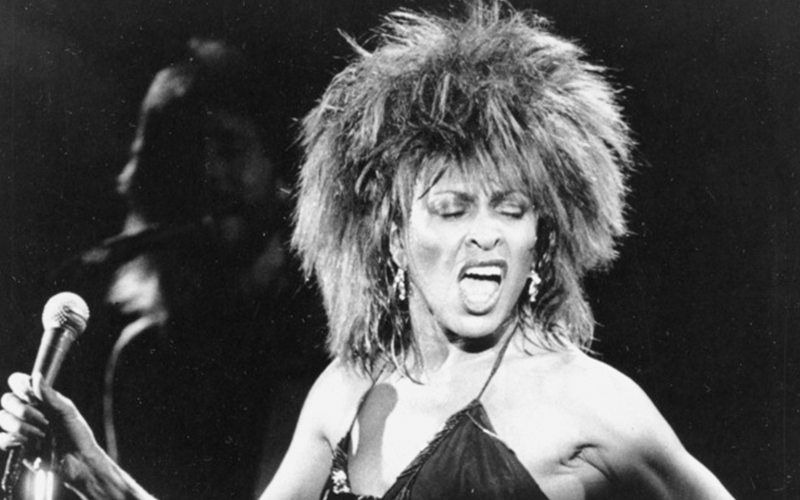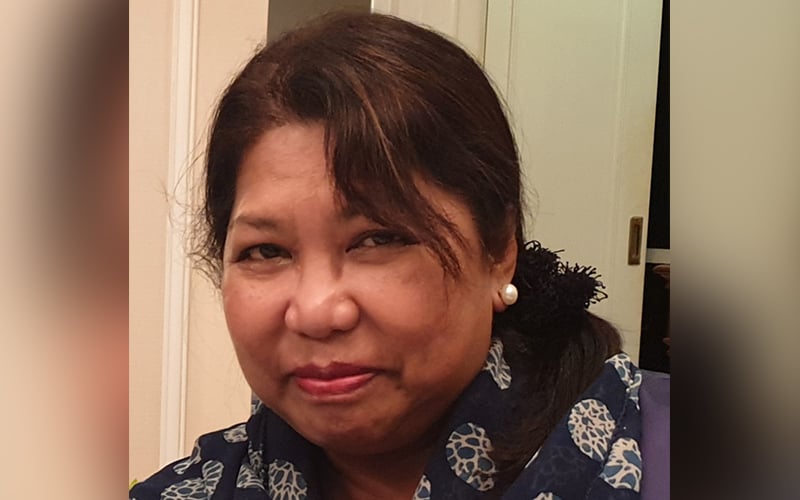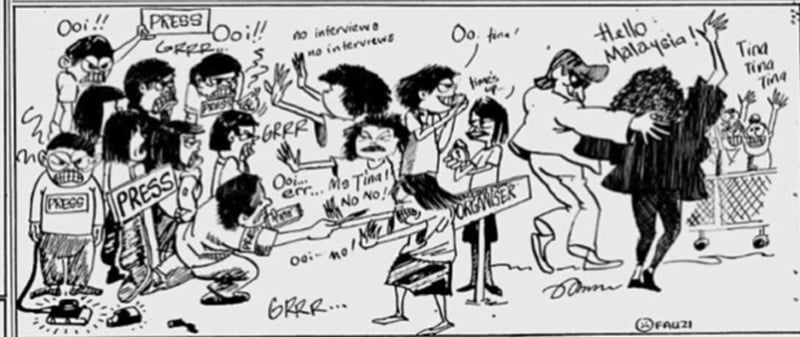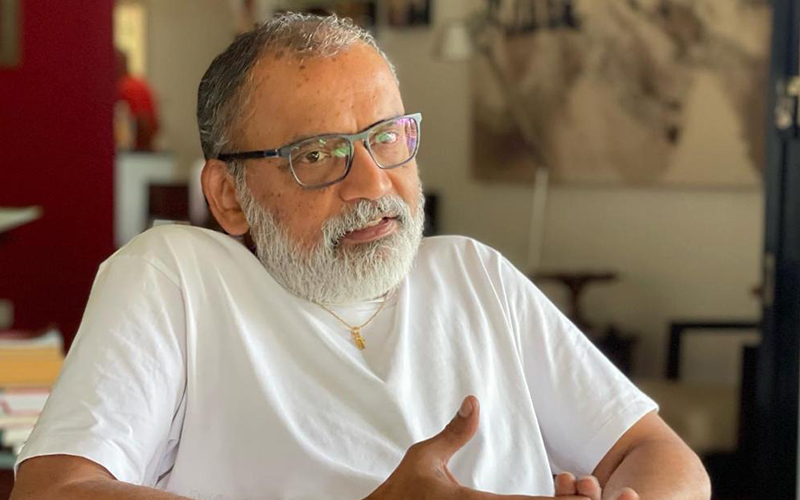MM:
When Tina Turner’s KL press meet turned into chaos
The superstar fell victim to anti-rock campaigners in a country where foreign rockers had long attracted criticism.

Like her song, Tina Turner was simply the best on stage, giving fans their money’s worth in entertainment value. (AP pic)
KUALA LUMPUR: An uproar erupted from the Umno-led Barisan Nasional (BN) when news broke that rock and soul powerhouse Tina Turner was to perform at Stadium Negara in 1988.
The argument was that rock music promoted drugs, the performers behaved and dressed obscenely on stage, and young people would be exposed to bad influence.
She eventually did perform on Feb 25 and Turner performed like the five-star performer she was. However, it must have been terrifying for the promoter of her concert because it could have been cancelled at the 11th hour.
On the eve of the show, chaos reigned at the press conference held at the Hilton Hotel in Kuala Lumpur where Turner was staying.
It was caused by a change in the schedule after the police informed that a certain religious group had planned to hold an anti-Tina Turner demonstration outside the hotel.
Recalling the incident, former New Straits Times entertainment reporter Saleha Ali, said: “For an event that had captured wide media and public attention, the press conference lasted a disappointing 15 minutes or less.”
KUALA LUMPUR: An uproar erupted from the Umno-led Barisan Nasional (BN) when news broke that rock and soul powerhouse Tina Turner was to perform at Stadium Negara in 1988.
The argument was that rock music promoted drugs, the performers behaved and dressed obscenely on stage, and young people would be exposed to bad influence.
She eventually did perform on Feb 25 and Turner performed like the five-star performer she was. However, it must have been terrifying for the promoter of her concert because it could have been cancelled at the 11th hour.
On the eve of the show, chaos reigned at the press conference held at the Hilton Hotel in Kuala Lumpur where Turner was staying.
It was caused by a change in the schedule after the police informed that a certain religious group had planned to hold an anti-Tina Turner demonstration outside the hotel.
Recalling the incident, former New Straits Times entertainment reporter Saleha Ali, said: “For an event that had captured wide media and public attention, the press conference lasted a disappointing 15 minutes or less.”

Saleha Ali wrote a cutting article about Tina Turner’s quickie media meet. (Saleha Ali pic)
She said Turner strolled in with a sultry “hi”, and before her seat could warm sufficiently, she said “bye”.
“The photographers were more unfortunate and those who were not quick on the draw, missed their shots as Tina twirled and turned for about 35 seconds,” she recounted.
She said the question and answer session was a brisk and impersonal affair, taking 10 minutes or less.
Each media organisation was allotted four questions but Saleha said she could only ask one question, while her Malay Mail colleague Angela Fernandez was among many reporters who never got their chance to interview Turner.
“It was a struggle to write the story because we didn’t have the Internet then, and had to rely on past articles in newspapers and from magazines.
“The demonstration did not take place, and the flurry and fluster that went with the organisation of the event seemed highly unnecessary and exaggerated,” Saleha said.
However, she added, Turner made up for the disappointment with all the firepower of a rock’n’roll star, singing 12 songs and an encore for some 10,000 fans.
Turner died last week, aged 83, after a long illness at her home in Switzerland, sparking an outpouring of grief and tributes from her adoring fans and grieving friends worldwide.
She said Turner strolled in with a sultry “hi”, and before her seat could warm sufficiently, she said “bye”.
“The photographers were more unfortunate and those who were not quick on the draw, missed their shots as Tina twirled and turned for about 35 seconds,” she recounted.
She said the question and answer session was a brisk and impersonal affair, taking 10 minutes or less.
Each media organisation was allotted four questions but Saleha said she could only ask one question, while her Malay Mail colleague Angela Fernandez was among many reporters who never got their chance to interview Turner.
“It was a struggle to write the story because we didn’t have the Internet then, and had to rely on past articles in newspapers and from magazines.
“The demonstration did not take place, and the flurry and fluster that went with the organisation of the event seemed highly unnecessary and exaggerated,” Saleha said.
However, she added, Turner made up for the disappointment with all the firepower of a rock’n’roll star, singing 12 songs and an encore for some 10,000 fans.
Turner died last week, aged 83, after a long illness at her home in Switzerland, sparking an outpouring of grief and tributes from her adoring fans and grieving friends worldwide.

A cartoon in the New Straits Times mocking Tina Turner’s media conference.
Clueless about rock music
Saleha’s colleague William de Cruz, who attended the press conference as an observer, but walked away with an exclusive interview with Turner, said rock music had always attracted criticism from “moral gatekeepers”, beginning a long time back.
He said in the 1960s and 70s, the government said Peter, Paul and Mary’s “Puff, The Magic Dragon” was about heroin, Deep Purple’s “Smoke on the Water” was about the water-pipe, and Christie’s “Yellow River’ was pro-China, pro-Communist because of “Yellow”.
“If you knew the facts, all of this is untrue. But, the truth did not matter, and all three songs were banned,” said de Cruz, from Sydney.
After Deep Purple broke up, he interviewed the lead singer Ian Gillan, who performed in Stadium Negara with his band, Ian Gillan Band.
He said when he asked Gillan about “Smoke on the Water” and the association with the water-pipe, he replied: “I don’t do drugs, I don’t do alcohol.”
“Smoke on the Water”, Gillan said, was about a blaze in Montreux, Switzerland. It was at a casino that staged a Frank Zappa concert, and Gillan had been in the audience.
Clueless about rock music
Saleha’s colleague William de Cruz, who attended the press conference as an observer, but walked away with an exclusive interview with Turner, said rock music had always attracted criticism from “moral gatekeepers”, beginning a long time back.
He said in the 1960s and 70s, the government said Peter, Paul and Mary’s “Puff, The Magic Dragon” was about heroin, Deep Purple’s “Smoke on the Water” was about the water-pipe, and Christie’s “Yellow River’ was pro-China, pro-Communist because of “Yellow”.
“If you knew the facts, all of this is untrue. But, the truth did not matter, and all three songs were banned,” said de Cruz, from Sydney.
After Deep Purple broke up, he interviewed the lead singer Ian Gillan, who performed in Stadium Negara with his band, Ian Gillan Band.
He said when he asked Gillan about “Smoke on the Water” and the association with the water-pipe, he replied: “I don’t do drugs, I don’t do alcohol.”
“Smoke on the Water”, Gillan said, was about a blaze in Montreux, Switzerland. It was at a casino that staged a Frank Zappa concert, and Gillan had been in the audience.

William de Cruz says music should never be seen as a threat, rather as one of the highest expressions of the human spirit. (Benjamin de Cruz pic)
The blaze forced Zappa to end the concert. Later, the members of Deep Purple were in a restaurant overlooking Lake Geneva. And they watched as the smoke from that casino fire settled on the waters of the lake.
“And that became the backbone of my Gillan interview. Ian Gillan doesn’t do drugs,” de Cruz said. “His concert went on without protest.”
He said in his time as secretary of the Musicians’ Union of Peninsular Malaysia (MUM), the government even began moves to ban open-air rock concerts, after an incident when part of a stage collapsed, which caused a bit of crowd panic.
“No one was hurt, but suddenly rock concerts as a whole were bad,” he said.
The then MUM president Freddie Fernandez, vice-president Michael Veerapan, treasurer Charles Peters and de Cruz, as representatives of Malaysian musicians, for whom performing was a job, had to say something.
De Cruz said: “We knew we had to protest the looming ban and call on the government to understand that the livelihood of Malaysian musicians was at stake.
“At the same time, we knew we could get into trouble if we openly defied the government. Further, we risked a ban by RTM which was the sole broadcasting organisation at the time, and that would mean a big loss of income for many musicians.
“We had to be non-confrontational in our press statement, and presented ourselves as sensible professionals calling for common sense, but politely.”
He said the government backed down and there was talk of strict regulations for promoters. “Everything went back to normal.”
‘Decadent’ foreign music
Malaysia was fast earning a name for itself as a high-risk business proposition for top-rung musicians and singers because of perceived decadent foreign music.
No one wanted to book Rod Stewart, and the closest he came to Malaysia on his 1980s world tour was Bangkok.
De Cruz was sent to interview Stewart and review the concert in Bangkok, by The Malay Mail editor Chua Huck Cheng, who saw performing arts for the wonderful creative world that it is.
He said: “The concert was held at night, and I was in a tiny room at the back of the Bangkok stadium the morning before, watching Stewart and his band rehearse and sound-check.
“It was so hot, they were dripping in sweat. And it came to me that performing, at that level, is very hard work. You simply cannot last the distance if you’re on drugs or alcohol. You have to be super-fit.”
Today, Stewart exists as a highly respected singer, musician, songwriter and philanthropist.
De Cruz said he had seen Bob Geldof of the Boomtown Rats come onstage in Sydney, barefoot, with long hair, “looking every bit the bad influence that Malaysian politicians keep pointing their pious fingers at.”
“This guy organised Live Aid and raised millions to feed the starving in Africa, but politicians would probably have thought his song, ‘I Don’t Like Mondays’, encouraged kids to stay away from school.”
The song, he said, was about a 16-year-old who opened fire on people in a playground in California and killed two adults. “Geldof was bemoaning the idea that a school-going boy could do such a horrible thing.”
He said top promoters in Malaysia had told him Bob Dylan would never have been allowed into Malaysia because he was a Jew.
“But, we traded with Israel at that time, and we still do. Today, Dylan is a holder of a Nobel Prize for Literature,” he said.
“Music is not a threat. The entire spectrum of performing arts is a beautiful thing that is one of the highest expressions of the human spirit,” said de Cruz, who rose to fame as a musician with his brother, the late Errol, after a standout performance on RTM’s Bakat TV in the 70s.
The blaze forced Zappa to end the concert. Later, the members of Deep Purple were in a restaurant overlooking Lake Geneva. And they watched as the smoke from that casino fire settled on the waters of the lake.
“And that became the backbone of my Gillan interview. Ian Gillan doesn’t do drugs,” de Cruz said. “His concert went on without protest.”
He said in his time as secretary of the Musicians’ Union of Peninsular Malaysia (MUM), the government even began moves to ban open-air rock concerts, after an incident when part of a stage collapsed, which caused a bit of crowd panic.
“No one was hurt, but suddenly rock concerts as a whole were bad,” he said.
The then MUM president Freddie Fernandez, vice-president Michael Veerapan, treasurer Charles Peters and de Cruz, as representatives of Malaysian musicians, for whom performing was a job, had to say something.
De Cruz said: “We knew we had to protest the looming ban and call on the government to understand that the livelihood of Malaysian musicians was at stake.
“At the same time, we knew we could get into trouble if we openly defied the government. Further, we risked a ban by RTM which was the sole broadcasting organisation at the time, and that would mean a big loss of income for many musicians.
“We had to be non-confrontational in our press statement, and presented ourselves as sensible professionals calling for common sense, but politely.”
He said the government backed down and there was talk of strict regulations for promoters. “Everything went back to normal.”
‘Decadent’ foreign music
Malaysia was fast earning a name for itself as a high-risk business proposition for top-rung musicians and singers because of perceived decadent foreign music.
No one wanted to book Rod Stewart, and the closest he came to Malaysia on his 1980s world tour was Bangkok.
De Cruz was sent to interview Stewart and review the concert in Bangkok, by The Malay Mail editor Chua Huck Cheng, who saw performing arts for the wonderful creative world that it is.
He said: “The concert was held at night, and I was in a tiny room at the back of the Bangkok stadium the morning before, watching Stewart and his band rehearse and sound-check.
“It was so hot, they were dripping in sweat. And it came to me that performing, at that level, is very hard work. You simply cannot last the distance if you’re on drugs or alcohol. You have to be super-fit.”
Today, Stewart exists as a highly respected singer, musician, songwriter and philanthropist.
De Cruz said he had seen Bob Geldof of the Boomtown Rats come onstage in Sydney, barefoot, with long hair, “looking every bit the bad influence that Malaysian politicians keep pointing their pious fingers at.”
“This guy organised Live Aid and raised millions to feed the starving in Africa, but politicians would probably have thought his song, ‘I Don’t Like Mondays’, encouraged kids to stay away from school.”
The song, he said, was about a 16-year-old who opened fire on people in a playground in California and killed two adults. “Geldof was bemoaning the idea that a school-going boy could do such a horrible thing.”
He said top promoters in Malaysia had told him Bob Dylan would never have been allowed into Malaysia because he was a Jew.
“But, we traded with Israel at that time, and we still do. Today, Dylan is a holder of a Nobel Prize for Literature,” he said.
“Music is not a threat. The entire spectrum of performing arts is a beautiful thing that is one of the highest expressions of the human spirit,” said de Cruz, who rose to fame as a musician with his brother, the late Errol, after a standout performance on RTM’s Bakat TV in the 70s.
Neighbouring Sing is a glittering 1st world country, while Malaysia remains mired in a 3rd World economy.
ReplyDeleteFor over 60 years , successive governments have focused on feeding the Race and Religion monster, instead of the fundamentals of building a successful economy.